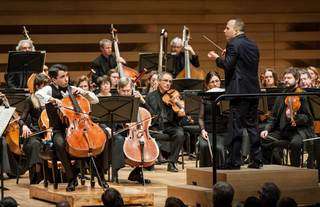|
Back
A thrilling visit Toronto
Koerner Hall
04/24/2015 - & April 16 (Rivière-des-Prairies), 7 (Montréal), 19 (Mercier–Hochelaga-Maisonneuve), 21 (Verdun), 23 (Pierrefonds), 2015
Edward Elgar: Variations on an Original Theme, Op. 36, "Enigma" – Cello Concerto in E Minor, Op. 85
Ralph Vaughan Williams: Symphony No. 4 in F Minor
Stéphane Tétreault (cello)
Orchestre Métropolitain, Yannick Nézet-Séguin (conductor)

S. Tétreault & Y. Nézet-Séguin (© Lisa Sakulensky)
This was the first visit to Toronto by Montreal’s Orchestre Métropolitan, the group Yannick Nézet-Séguin assumed leadership of 15 years ago at the ripe young age of 25.
As can be seen from the group’s list of recordings, they have never shied away from tackling big, challenging works, as became evident in this ambitious program.
Elgar’s Enigma Variations is a well-loved piece that is often featured as the heaviest work on a lightweight program. In this instance it was far from an easy-listening bauble, but given an intensely thoughtful and absorbing performance. At first I felt the conductor was overstating it with self-indulgent, mannered phrasing, but by the third variation I was captured by the well-ordered flow. The 70-member ensemble is just about the largest orchestra to perform in the 1100-seat hall (the Esprit Orchestra occasionally bulks up to similar size), but even at the big moments it did not overwhelm the space. Koerner Hall permits an intimate sound, and the introduction to the Nimrod variation was well below pianissimo before it swelled up very impressively. The wonderful result was that the familiar work moved one anew.
An even bigger dose of Elgar came with the cello concerto. Soloist Stéphane Tétreault was once a member of this orchestra. He is now 21 (and looks more like 14) and delivers a truly ardent performance of this introspective, wrenching piece. There was much intense eye contact between soloist and conductor, and between soloist and concertmaster Yukari Cousineau. The listener felt both exhilarated and drained by the end.
Mr. Tétreault is acclaimed as a rising star in Quebec and I expect this opinion will spread. Watch for him.
As far as I was concerned, the two Elgar works made up a more than satisfactory concert. Thanks to an prolonged interval, we managed to get our receptive energy up for yet another meaty work, Ralph Vaughan Williams’ boisterous and conflicted Symphony No. 4, premiered in 1935. In his remarks to the audience, Nézet-Séguin told us that he sees the work as the result of a thoughtful, mild-mannered man deciding to express pent-up frustrations in one huge statement. Significantly, Vaughan Williams dedicated the work to a younger composer, Arnold Bax, who had composed several symphonies that seemed to have expressed the turmoil of a troubled age (a contrast with Vaughan Williams’ more detached, frequently bucolic, approach).
It was only after World War II that W.H.Auden published his book of poetry The Age of Anxiety, quickly followed by Leonard Bernstein’s symphony of the same name - but (at least judging from this ultra-expressive performance) - RVW got there first. Here are quotes from Keith Horner’s exemplary program notes: “crunching dissonances”, “abrasive orchestration”, “strident sequence”, “irregular chordal interjections”, “ghostly coda” - and that is just the first movement. The following movements take us through a variety of expression (not always anguished), but then offers no resolution at the end.
The conductor also cautioned us that the performance “in this not-large hall” was going to be loud. And it certainly was. This orchestra performs in several venues in and around Montreal; for this piece, a space larger than Koerner Hall would have been more fitting. But what a vivid and up-close experience!
The old (and surely out-of-date) opinion held in French Canada was that people in Toronto did little but sip tea and listen endlessly to the Pomp and Circumstance Marches. Thus it seemed a bit piquant that a Montreal orchestra would bring such a solidly British program here. Whatever the motivation, it was a terrific success.
It has been awhile since Maestro Yannick conducted in Toronto. He brought his Rotterdam orchestra here in 2010, but who can forget the evening in 2007 when he conducted both the Toronto Symphony Orchestra and a performance of Faust for the Canadian Opera Company? He doesn’t have to be that heroic ever again, but return visits would surely be welcome.
Michael Johnson
|